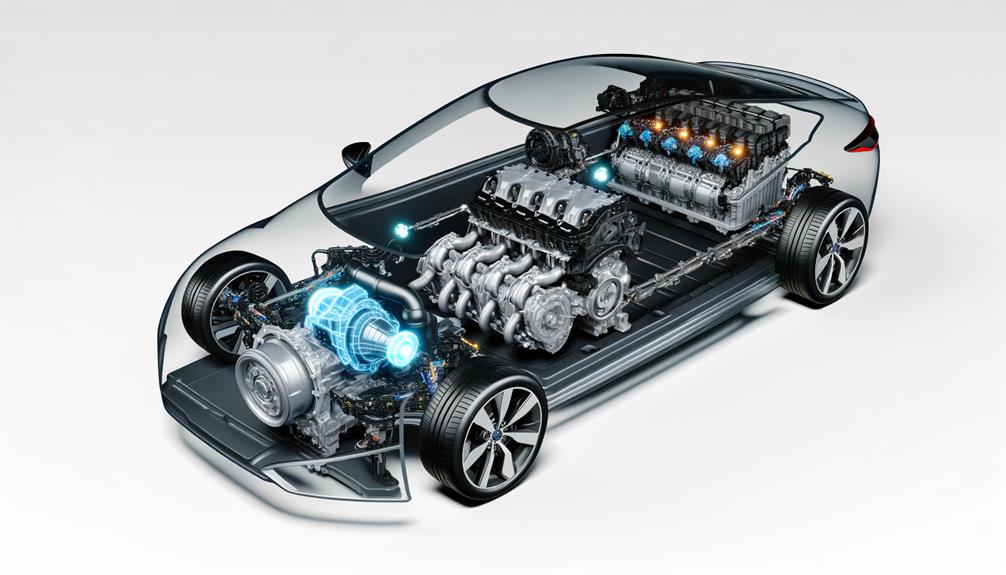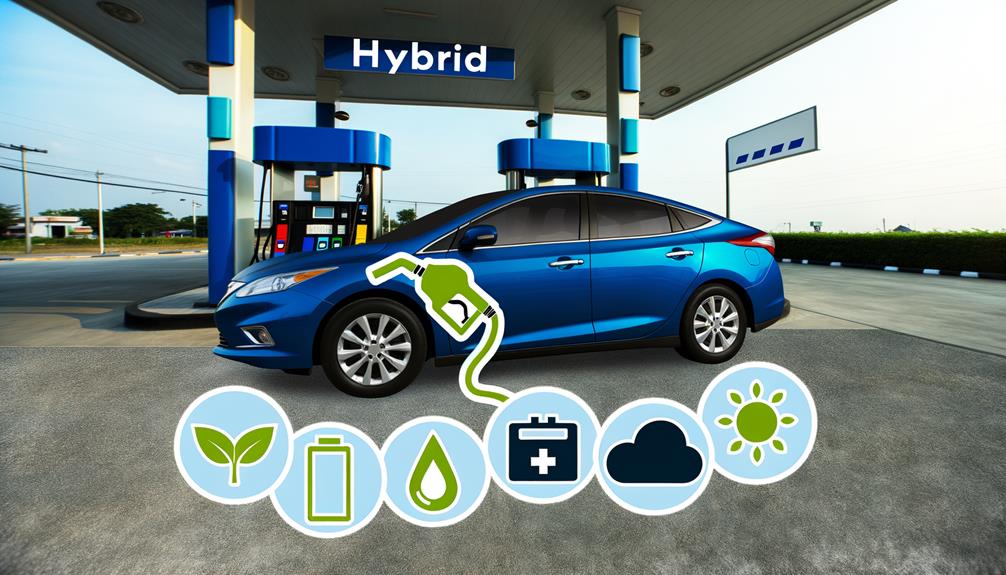You might be wondering if a hybrid car can run solely on gasoline, especially if the battery's depleted. The short answer is yes, but there's more to evaluate. Hybrid vehicles, like the Toyota Prius, are designed to seamlessly switch between electric and gasoline power. However, relying only on gas can affect performance and efficiency. Why would you opt for gas-only mode, and what are the trade-offs? Understanding these dynamics can help you make informed decisions about your hybrid's operation. Let's explore the intricacies and real-world implications of this option.
Contents
Understanding Hybrid Vehicles
Hybrid vehicles, a blend of internal combustion engines (ICE) and electric motors, represent a noteworthy innovation in automotive technology. These systems combine gasoline power with electric propulsion, resulting in improved fuel efficiency and reduced emissions performance. One of the most well-known examples of a full hybrid system is the Toyota Prius. This vehicle can operate on electric power alone at low speeds and seamlessly switch to gasoline power for higher speeds or when additional acceleration is required.
In a hybrid system, the internal combustion engine and the electric motor work in tandem to optimize performance. The electric motor provides immediate torque, which enhances acceleration and reduces the load on the gasoline engine. This synergy between power sources results in better fuel economy compared to traditional ICE vehicles. When the battery depletes, the gasoline engine takes over, ensuring that the vehicle remains operational. However, it is essential to recognize that some hybrids may experience reduced performance or efficiency when operating without electric assistance.
The dual power sources in hybrid vehicles mean that emissions performance is remarkably improved. While the gasoline engine typically engages during acceleration or when the battery is low, the electric motor can handle low-speed driving, which is often the least efficient and most polluting phase for an ICE. By leveraging the strengths of both power sources, hybrids like the Toyota Prius achieve a balanced and efficient driving experience.
Understanding how hybrid systems work is vital for appreciating their benefits. These vehicles are designed to maximize fuel efficiency and minimize emissions by intelligently managing the interplay between the internal combustion engine and the electric motor.
Gas-Only Operation
When examining the capabilities of hybrid vehicles, it's important to understand how they perform under gas-only operation. Many hybrid vehicles, such as the Toyota Prius, can indeed run on gasoline alone if the electric battery is depleted. However, you should be aware that performance might be compromised in such scenarios. For instance, the vehicle's responsiveness and fuel efficiency could be reduced compared to when both the gasoline engine and electric power are utilized.
Full hybrids are engineered to seamlessly shift between electric and gas power sources. This design guarantees that gas-only operation kicks in when needed, especially during high-speed driving or heavy acceleration. It's worth noting that some hybrid models, like the Chevy Tahoe and Silverado hybrids, require a full gas tank to operate, regardless of the battery charge. This is a vital consideration if you're planning to rely solely on gas.
Typically, the gasoline engine of a hybrid vehicle takes over once the vehicle exceeds low-speed thresholds, usually around 15 mph. This mechanism assures that the vehicle continues to run even if the electric power is depleted. However, while operating a hybrid in gas-only mode is feasible, be prepared for a decrease in fuel efficiency and a less responsive driving experience compared to when both power sources are active.
Hybrid Engine Mechanics

To understand hybrid engine mechanics, it's essential to grasp how the integration of an internal combustion engine (ICE) and an electric motor enhances vehicle performance. In a hybrid vehicle, the ICE and the electric motor work in tandem to optimize fuel economy and reduce emissions. At low speeds, the electric motor often takes the lead, providing additional torque and minimizing gasoline consumption. This is particularly advantageous in urban environments where stop-and-go traffic is common.
The gasoline engine in a hybrid vehicle typically engages seamlessly when higher power is needed. This happens during rapid acceleration, when cruising at higher speeds, or when the electric battery is depleted. You don't have to manually switch between the two; the system is designed to automatically select the most efficient power source. However, while a hybrid can run on the gasoline engine alone, this mode isn't as effective. Continuous operation without electric assistance can lead to decreased fuel economy and increased emissions.
For instance, the Toyota Prius can operate exclusively on its gasoline engine if the battery is exhausted, though the performance and efficiency will be noticeably reduced. The ICE relies on the gas tank for fuel, and while it guarantees you can still drive, it's not the ideal mode for extended periods. The electric motor's contribution at low speeds is significant for the hybrid's overall performance and efficiency. Understanding these mechanics helps you appreciate the sophisticated balance that hybrid vehicles achieve between performance, fuel economy, and emissions reduction.
Benefits of Gas Mode
When operating in gas mode, your hybrid car offers the significant advantage of an extended driving range, often exceeding 300 miles without needing to refuel. This mode guarantees consistent fuel availability, especially in areas where electric charging stations are sparse. Additionally, you'll experience robust performance and dependable acceleration, particularly useful for longer trips and highway driving.
Extended Driving Range
Hybrid vehicles offer a significant advantage with their extended driving range, particularly when operating in gas mode. When the electric battery depletes, hybrid vehicles seamlessly switch to gasoline, ensuring continuous driving. This capability is essential for long trips where charging infrastructure may be scarce. The gasoline engine in hybrids typically engages at higher speeds or during acceleration, thereby maintaining ideal performance without the need for electric assistance.
This gas mode operation enhances fuel efficiency by 20-35% over conventional gasoline vehicles, depending on the model and driving conditions. Models like the Toyota Prius are known for their seamless interchange between power sources, delivering an uninterrupted driving experience. With a combined driving range exceeding 500 miles from both the fuel tank and electric battery, hybrid vehicles allow for extended travel without frequent refueling stops.
In terms of performance, the gasoline engine's integration provides a robust response during demanding driving scenarios, ensuring that you won't compromise on power. The extended driving range and fuel efficiency benefits make hybrid vehicles an attractive option for those seeking both convenience and environmental benefits in their long-distance travel.
Fuel Availability Advantage
A significant advantage of hybrid vehicles is their ability to run solely on gasoline, allowing you to refuel at any standard gas station. This is particularly beneficial in regions where charging infrastructure is sparse or underdeveloped. Hybrid cars can seamlessly switch to gas mode, ensuring that you're not stranded without a charging station.
When operating in gas mode, hybrids typically achieve fuel efficiencies that are 20-35% better than conventional gasoline vehicles. This efficiency translates to cost savings and an extended driving range, often exceeding 300 miles before needing to refuel. The gas engine can seamlessly take over during high-speed driving or when additional power is necessary, ensuring there's no performance loss.
Another benefit of utilizing the gas mode is the ability to preserve the battery's charge. This is especially useful in scenarios where electric power is more advantageous, such as stop-and-go traffic or low-speed driving. By preserving the battery, you can optimize the vehicle's performance and efficiency across different driving conditions. Consequently, the dual capability of hybrid cars to operate on gasoline offers flexibility and reliability, making them a practical choice for diverse driving environments.
Limitations and Considerations

Despite the versatility of hybrid vehicles, relying solely on gasoline presents several limitations and factors to take into account. When the gas engine kicks in, you may notice a dip in performance, particularly because hybrids offer optimal performance when both the electric and gas systems work in tandem. The integrity of a hybrid system heavily relies on this coordination, and operating on gas alone disrupts the balance.
Firstly, hybrids are designed with a dual-power management system, allowing them to utilize electric power at lower speeds and switch to gasoline for higher demands. Running solely on gas compromises fuel efficiency and negates the benefits that hybrids offer in urban driving scenarios.
Secondly, certain models like the Chevy Tahoe and Silverado won't function if the gas tank is empty, regardless of the battery's charge level. Maintaining a sufficient fuel level is vital to avoid such complications.
Extended operation without adequate gas can risk battery damage. The hybrid system is not designed to run on a depleted gas tank for prolonged periods, and doing so may lead to costly repairs and potential system failures.
Moreover, while some hybrids can run briefly on battery power after running out of gas, this is only a temporary solution. For instance, a Toyota Prius may continue for a short distance but will eventually need gas to maintain functionality.
Here are some key points to take into account:
- Performance: Reduced when gas engine kicks in alone.
- Fuel Efficiency: Considerably lowered without electric power.
- Hybrid System Integrity: Compromised by running without gas.
- Battery Damage: Increased risk with extended gas-only operation.
- Gas Tank: Essential for maintaining dual-power system balance.
Battery Maintenance
Regular maintenance of the hybrid battery is essential to guarantee ideal vehicle performance and longevity. Monitoring the hybrid battery's performance regularly is significant. Signs such as decreased fuel efficiency and unusual noises can indicate battery issues that necessitate immediate attention. Proactive maintenance is key to identify these signs early, preventing more severe problems down the line.
Keeping the gas tank sufficiently full is another important aspect of hybrid vehicle maintenance. Many systems in hybrid vehicles rely on gasoline to function effectively and prevent battery damage. Confirming that your gas tank is not running low can help maintain the integrity of your hybrid battery and contribute to the overall performance of your vehicle.
Hybrid batteries typically have a lifespan of 8-10 years or around 100,000 miles. However, this lifespan can be extended through diligent battery maintenance. By regularly checking the battery's health and addressing any issues promptly, you can maximize its longevity and performance, confirming your vehicle runs efficiently for a longer period.
When it comes time to replace the hybrid battery, opting for high-performance replacement batteries from reputable sources is highly recommended. These replacement batteries guarantee reliability and efficiency, keeping your hybrid vehicle in peak condition. Ignoring battery maintenance can lead to costly repairs or replacements, underscoring the importance of regular checks to maintain the hybrid system's integrity.
Real-World Examples

Hybrid vehicles in the real world provide fascinating case studies of how they can run on gas only. For instance, the Toyota Prius is an exemplary model that can switch to gasoline when its electric battery depletes. However, it's crucial to note that while the Prius remains functional, its performance may not be ideal compared to when both the gasoline and electric motor power the vehicle.
Similarly, the Ford Escape Hybrid is engineered to guarantee continuous operation on gasoline once the electric battery is exhausted. This design assures that you won't be stranded if the electric charge runs out, although it might affect the overall driving dynamics.
Mild hybrids, like the Honda Insight, present another interesting case. These vehicles mainly rely on gasoline, with the electric motor providing supplementary assistance rather than acting as a primary power source. This approach guarantees better fuel efficiency than traditional gasoline vehicles while maintaining operational simplicity.
In contrast, the Lexus RX Hybrid is designed with a system that prevents exclusive battery power usage. This precaution guarantees that gasoline is always utilized to avoid potential damage to the vehicle's components, thereby providing a reliable driving experience.
When examining the fuel efficiency of hybrids running solely on gasoline, you'll find that they typically outperform traditional gasoline vehicles. These vehicles often achieve 20-35% more miles per gallon, making them a more economical choice even when not leveraging their electric capabilities.
- Toyota Prius: Operates on gasoline with compromised performance when the battery is depleted.
- Ford Escape Hybrid: Designed to run on gas if the electric battery runs out.
- Honda Insight: Relies mainly on gasoline, with the electric motor for assistance.
- Lexus RX Hybrid: System guarantees gasoline is always used to prevent damage.
- Fuel Efficiency: Hybrids running on gas only typically achieve 20-35% more miles per gallon than traditional gasoline vehicles.
These real-world examples highlight the versatility and efficiency of hybrid vehicles, demonstrating their capability to run on gasoline alone when necessary.
Frequently Asked Questions
Can You Just Use Gas in a Hybrid Car?
Yes, you can just use the gas engine in a hybrid car. Hybrid technology allows the gas engine to operate alone, but it affects fuel efficiency, driving range, maintenance costs, performance comparison, and environmental impact, influencing consumer choice.
Will a Hybrid Car Still Run Without the Battery?
Without a functioning battery, a hybrid car's performance and fuel efficiency will suffer. Engine operation relies on the battery as a power source. Ignoring maintenance costs can reduce driving range, compromise hybrid technology, and shorten the vehicle's lifespan.
What Happens When a Hybrid Car Runs Out of Electricity?
When a hybrid car's electric range depletes, it relies on its gasoline engine. Battery depletion impacts hybrid efficiency, increasing fuel consumption. Regenerative braking and power management are limited. To restore performance, explore charging options or alternative driving modes.
What Is the Downside of a Hybrid Car?
The downside of a hybrid car includes higher maintenance costs, pricey battery replacement, and complex engine performance. Limited charging infrastructure and lower resale value affect fuel efficiency and environmental impact, while long distance travel and driving experience may suffer.
Conclusion
In summary, while you can drive a hybrid car on gas only, it's crucial to understand the trade-offs involved. You'll experience reduced fuel efficiency and possibly lower performance compared to utilizing both power sources. However, for long trips or when the battery is depleted, gas-only mode is a practical fallback. Regular maintenance of your hybrid's battery guarantees peak performance, allowing you to fully benefit from the vehicle's dual power capabilities.
